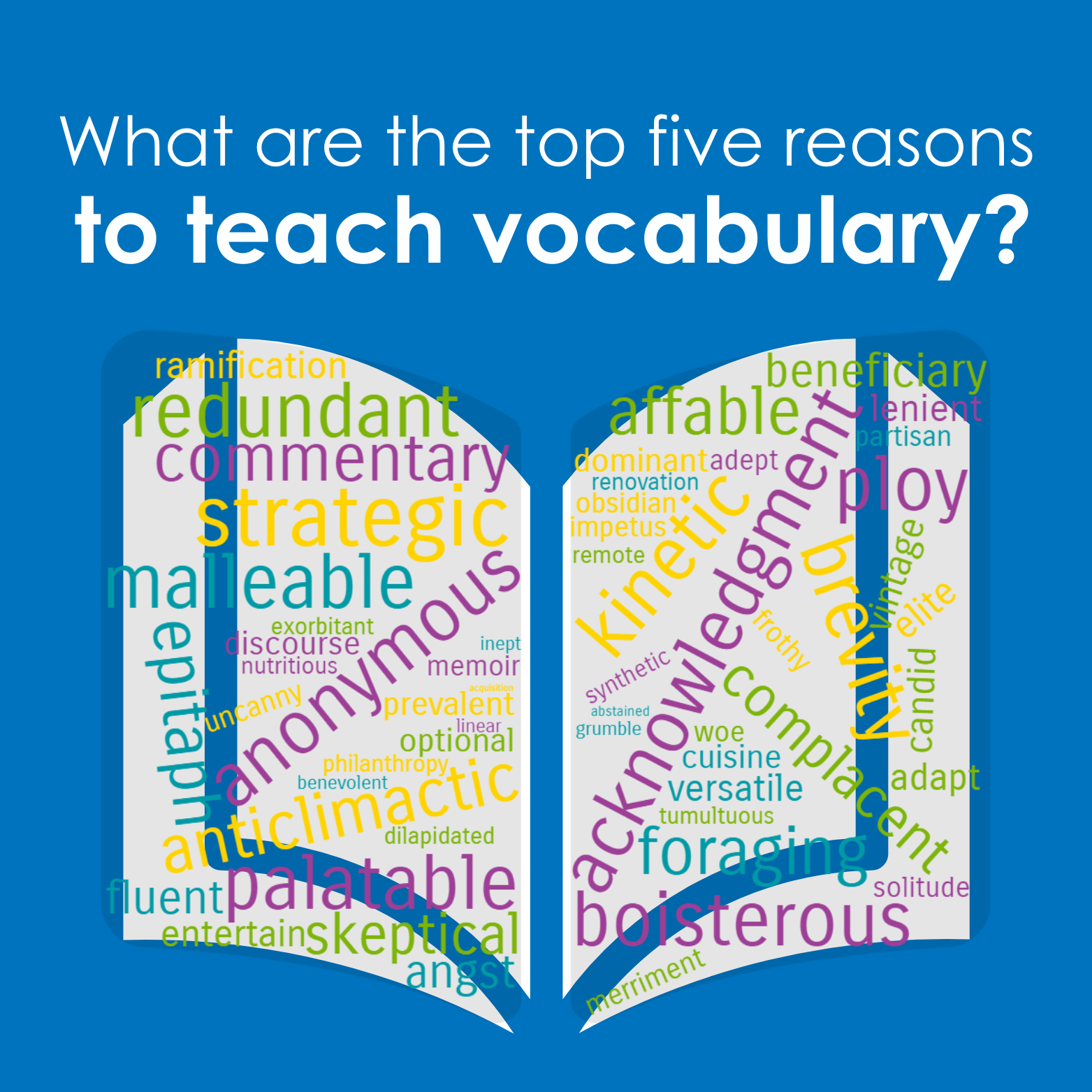Research has shown that we need to understand at least 98% of the words we read to understand what we are reading. Improving vocabulary skills will improve comprehension of novels and textbooks. Did you know that if a student is not an avid reader, they will not have the necessary exposure to the complex vocabulary in text that will allow their reading and writing vocabulary to develop? Having a large vocabulary to draw upon can help you produce more effective writing. Students need to use a more formal tone when writing – not conversational language – and to do that, they need a richer vocabulary bank to draw from in order to pull out those words we don’t often use when we speak. Children who develop a rich vocabulary tend to be deeper thinkers and express themselves better. Improving language and literacy skills early in life will enable them to more easily communicate and succeed academically. Successful communication, or “saying what you mean,” is dependent upon having a good vocabulary base. Using more precise words, when speaking makes you a more effective communicator. Researcher Johnson O’Connor found that “a person’s vocabulary level is the best single predictor of occupational success." Success in the workplace depends on your communication skills. Misinterpretations that arise in everyday personal and professional discussions highlight the critical role of vocabulary in communication generally, and even more so in health care. "Without the common understanding that comes from vocabulary, these misinterpretations extend to affect care delivery, and ultimately, patient outcomes. Communicating information is necessary to objectively make health care decisions, yet information is useless without vocabulary." (McCormick & Jones) Vocabulary is not only important in business, in work, and in our health care; it is also imperative in our personal relationships. Words are the puzzle pieces that we use to convey our thoughts and ideas, share important information, show our understanding of others, and help us grow relationships with family and friends. A strong vocabulary can help foster a healthy life. Have you ever wondered what’s holding your students back? Low receptive vocabulary plays a huge role in poor reading comprehension in Grades 2-12 and continues to plague adults in their personal lives and in the workplace. A person's reading vocabulary is all the words they recognize and understand when reading. This class of vocabulary is generally the most abundant, as new words are more commonly encountered when reading than when listening. A person's listening vocabulary comprises the words recognized and understood when listening to speech. Cues such as the speaker's tone and gestures, the topic of discussion, and the conversation's social context may convey the meaning of an unfamiliar word. A person's speaking vocabulary comprises the words used in speech and is generally a subset of the listening vocabulary. Due to the spontaneous nature of speech, words are often misused slightly and unintentionally, but facial expressions and tone of voice can compensate for this misuse. The written word appears in registers as different as formal essays and informal social media feeds. While many written words rarely appear in speech, a person's written vocabulary is generally limited by preference and context: a writer may prefer one synonym over another, and they will be unlikely to use technical vocabulary relating to a subject in which they have no interest or knowledge. The American philosopher Richard Rorty characterized a person's "final vocabulary" as follows: All human beings carry about a set of words which they employ to justify their actions, their beliefs, and their lives. These are the words in which we formulate praise of our friends and contempt for our enemies, our long-term projects, our deepest self-doubts and our highest hopes… I shall call these words a person's "final vocabulary". Those words are as far as he can go with language; beyond them is only helpless passivity or a resort to force. (Contingency, Irony, and Solidarity p. 73)[5] See It in action! ✔ Explore InferCabulary!
Top Five Reasons to Teach Vocabulary
Vocabulary Acquisition Improves Reading Comprehension
Vocabulary Is Necessary for Expressive and Persuasive Writing
Vocabulary Is Important for Language Development
Vocabulary Is Key for Conceptualizing and Communicating
Vocabulary Is Important for Success in Life
What Are the Different Types of Vocabulary?
Reading Vocabulary
Listening Vocabulary
Speaking Vocabulary
Writing Vocabulary
Final Vocabulary

✔ Attend a free 3-hour Science of Reading Vocabulary Workshop!
✔ Read more about the effectiveness of abstract vocabulary instruction and the research behind it.
Are you looking for a Science of Reading curriculum solution? Don't make a decision without looking at our exceptional, efficient, and scientifically aligned approach used in our reading programs. We have been teaching the Science of Reading for 18 years. Whether it be our professional development, diagnostics, student grouping, reading interventions, and whole class reading instruction, everything we offer is firmly and deeply rooted in the Science of Reading.
Speak to an Expert. Schedule a Science of Reading Curriculum Overview
Schedule Here
Vocabulary Research Articles
Kathleen A. McCormick, PhD, RN, FAAN, FRCNA, FACMI and Cheryl B. Jones, PhD, RN. Is One Taxonomy Needed for Health Care Vocabularies and Classifications?https://ojin.nursingworld.org/MainMenuCategories/ANAMarketplace/ANAPerio...
NICOLE BRUN-MERCER Northern Arizona University, Flagstaff CHERYL BOYD ZIMMERMAN California State University, Fullerton, Fostering Academic Vocabulary Use in Writing https://files.eric.ed.gov/fulltext/EJ1111751.pdf


